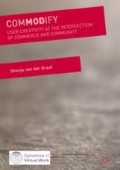Abstract
This chapter presents an empirical analysis of knowledge contributions made by users and employees of Linden Lab. The analysis yields insight into user participation on the firm-hosted platform by linking the design capabilities and design space to various communication practices. The findings demonstrate that Second Life is a site where various contributions by both users and the developer firm generate ideas about discovering, developing and refining creative practices associated with firm learning that contribute to ongoing platform development. The analysis highlights roles of mentorship and mastery of various communication systems as important ways to embed newcomers in the firm’s cross-border labour processes and also to assist in career advancement opportunities.
Access this chapter
Tax calculation will be finalised at checkout
Purchases are for personal use only
References
Berdou, E. (2011). Organization in Open Source Communities: At the Crossroads of the Gift and Market Economies. New York: Routledge.
de Valck, K. (2005). Virtual Communities of Consumption: Networks of Consumer Knowledge and Companionship. Unpublished Ph.D., Erasmus University Rotterdam, Rotterdam.
Field, A. (2005). Discovering Statistics Using SPSS (2nd ed.). London: Sage.
Frederiksen, L. (2006). User Communication Driving Firm Innovation: A Communication Patterns Perspective on Personal Attributes and Communication Types in an Online User Community. Retrieved July 16, 2007, from http://www2.druid.dk/conferences/viewpaper.php?id=540&cf=8
Morrison, P. D., Roberts, J., & Midgley, D. (2004). The Nature of Lead Users and Measurement of Leading Edge Status. Research Policy, 33(2), 351–362.
van der Graaf, S. (2012). Get Organized at Work! A Look Inside the Game Design Process of Valve and Linden Lab. Bulletin of Science, Technology & Society, 32(6), 480–488. ISSN 0270-4676.
Author information
Authors and Affiliations
Rights and permissions
Copyright information
© 2018 The Author(s)
About this chapter
Cite this chapter
van der Graaf, S. (2018). Learning and the Imperative of Production in Mod Development. In: ComMODify. Dynamics of Virtual Work. Palgrave Macmillan, Cham. https://doi.org/10.1007/978-3-319-61500-4_5
Download citation
DOI: https://doi.org/10.1007/978-3-319-61500-4_5
Published:
Publisher Name: Palgrave Macmillan, Cham
Print ISBN: 978-3-319-61499-1
Online ISBN: 978-3-319-61500-4
eBook Packages: Social SciencesSocial Sciences (R0)

